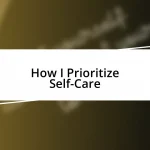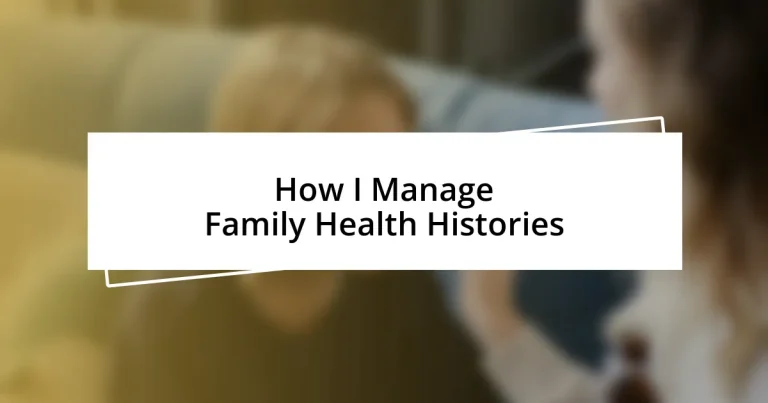Key takeaways:
- Understanding family health histories is crucial for making informed health decisions, as it reveals patterns and risks that may affect individuals.
- Engaging in open conversations with family members about health can strengthen bonds and uncover important health information.
- Regularly updating family health records is essential for identifying emerging health issues and ensuring proactive healthcare management.
- Utilizing technology, such as health apps, enhances the ability to track and share family health histories, facilitating better communication with healthcare providers.
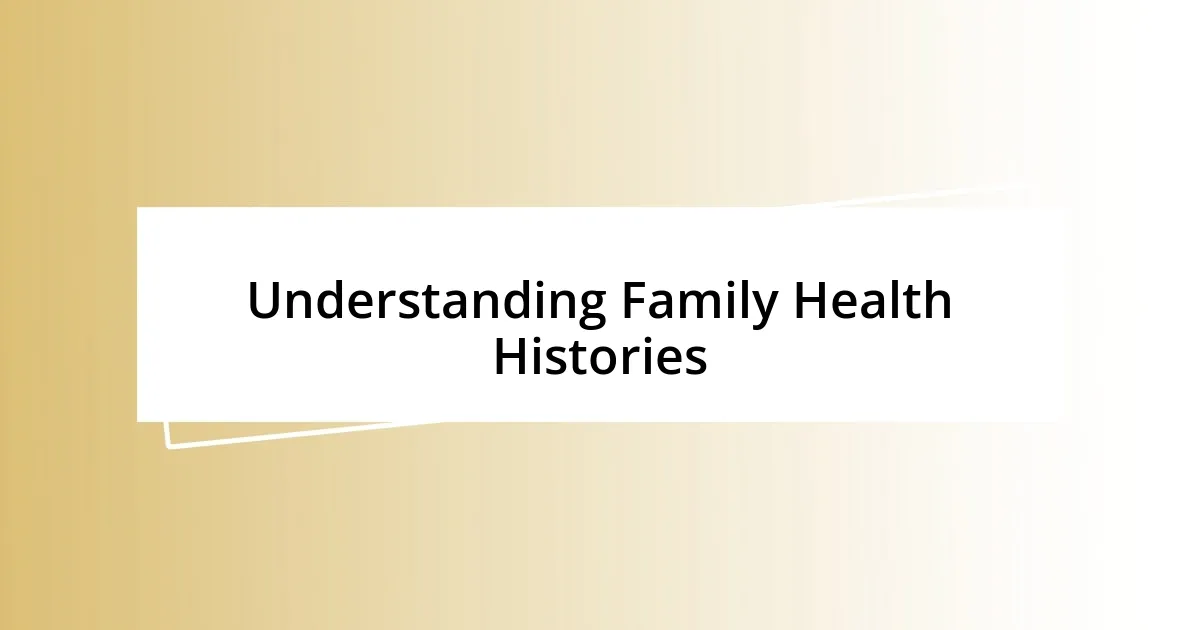
Understanding Family Health Histories
Understanding family health histories can feel a bit overwhelming, but it’s such an essential part of being proactive about our health. I remember sitting down with my grandmother one afternoon, and she opened up about her family’s medical past. It struck me how much I didn’t know—like the heart disease that ran through my grandfather’s side, which later prompted me to make lifestyle changes. Does everyone in your family know their health background?
When I delve into family health histories, I see them as a roadmap, guiding my health decisions. It’s fascinating how traits and conditions can weave through generations. For instance, my aunt’s battle with breast cancer made me reflect deeply—are we paying enough attention to patterns that could inform our health choices? Connecting these dots can empower us in ways we often overlook.
Each conversation about health history can unravel stories that shape our understanding of our own bodies. I recall a family reunion where someone casually mentioned diabetes that affected multiple relatives. It made me think: Are we really listening to these narratives? By immersing ourselves in these family stories, we gain insights that can not only enhance our health but also foster a sense of familial unity and support.
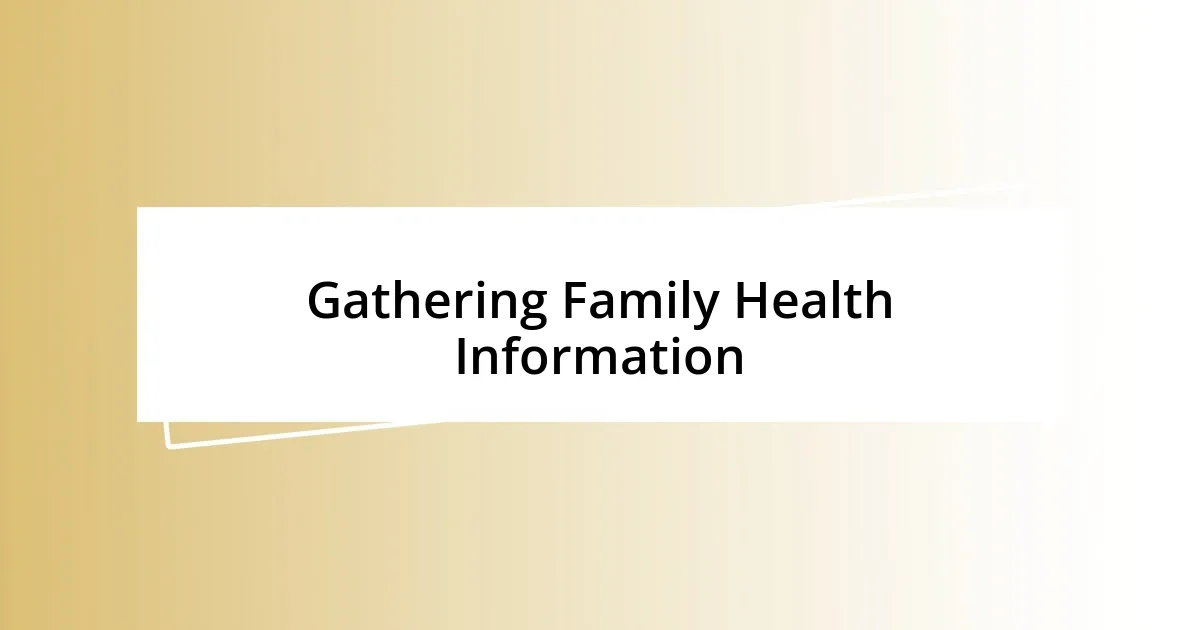
Gathering Family Health Information
Gathering family health information is a process that requires both curiosity and sensitivity. When I first began collecting this information, I felt a mix of excitement and apprehension. I remember asking my mother about her own health experiences, and the conversations often took unexpected turns—she would recall her father’s struggles with high blood pressure, which led us to discuss our own lifestyle habits around diet and exercise. It’s incredible how opening up about health can strengthen these family bonds.
I find it helpful to create a simple health questionnaire for family members. I’ve even turned it into a fun activity at family gatherings. While discussing our family health history, I encourage everyone to share stories, like how my cousin dealt with allergic reactions that seemed to run in the family. It’s moments like these that illuminate patterns we may not have noticed before—these conversations often reveal connections that can be crucial for our health journeys.
It’s important to be thoughtful about how we approach these discussions. I sometimes sense hesitation among relatives when it comes to discussing sensitive topics, especially regarding mental health issues. A close friend shared how her father’s struggle with depression remained largely unspoken until she took the initiative to ask him directly. That moment of vulnerability not only brought them closer but also sparked a broader conversation within the family. This kind of openness can help us all understand the threads of our health history more clearly.
| Method | Description |
|---|---|
| Direct Conversations | Talking one-on-one with family members to uncover specific health histories. |
| Health Questionnaires | Creating forms that family members can fill out, detailing health conditions and concerns. |
| Family Reunions | Utilizing gatherings to share health stories in an engaging way that encourages participation. |
| Research and Documentation | Exploring family genealogy and existing medical records that may shed light on health patterns. |
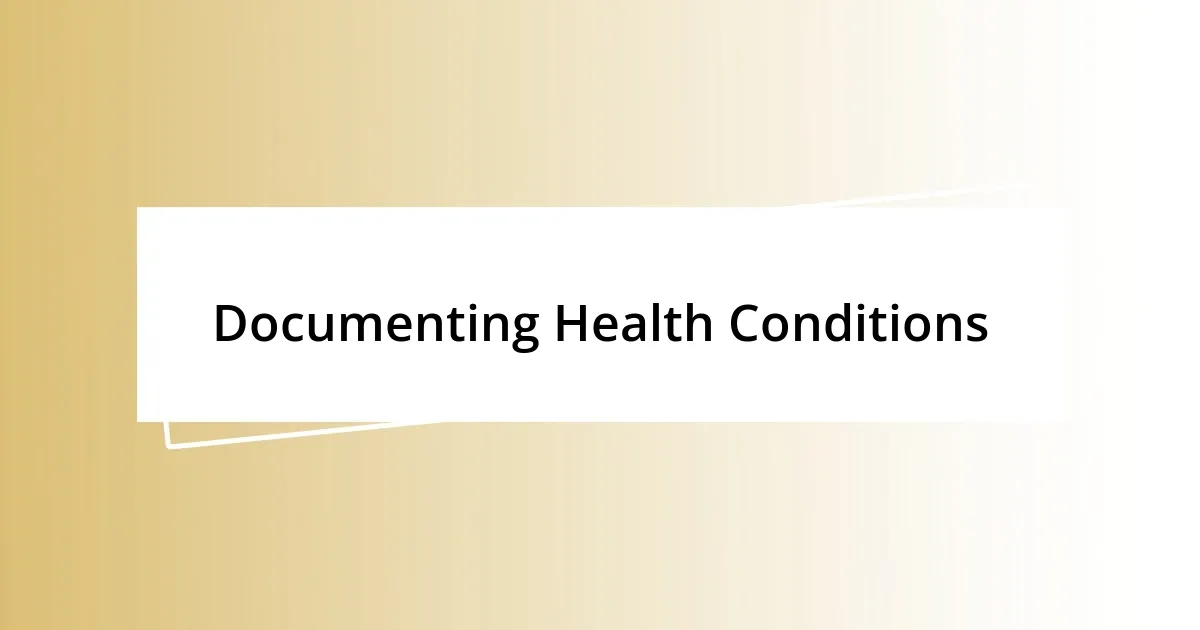
Documenting Health Conditions
Documenting health conditions is an ongoing endeavor for me, often tucked away amidst the chaos of daily life. I vividly recall the time I made a dedicated effort to jot down my family’s health history; it felt like piecing together a puzzle. Each condition I noted, from my uncle’s recent heart surgery to my cousin’s autoimmune disorder, revealed patterns that began to resonate deeply with me. It’s amazing how just a few simple notes can hold power over our health decisions.
To keep this process organized, I’ve developed a habit of noting key health details in a shared family document. This not only keeps information accessible but fosters a spirit of collective awareness. Here are some crucial elements I recommend including when documenting health conditions:
- Condition Name: Specific illnesses or health issues encountered by family members.
- Relation to Family Member: This helps trace patterns across generations.
- Age of Diagnosis: Understanding when a condition appeared can indicate risk factors.
- Treatment History: Any treatments or interventions that family members have pursued may provide insights into effective management options.
- Lifestyle Factors: Notes on lifestyle choices that could relate to disease, like smoking or diet.
This approach has not only enhanced my understanding but also opened doors for family members to discuss their health experiences candidly, creating a more supportive environment for everyone involved.
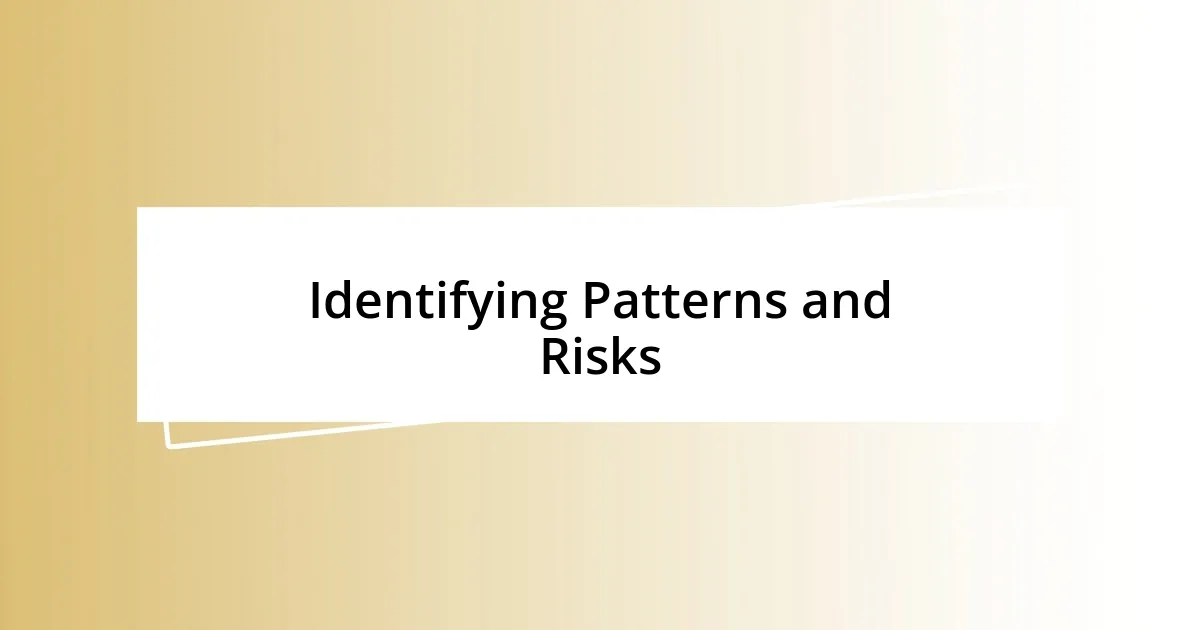
Identifying Patterns and Risks
Identifying health patterns within my family has been one of the most illuminating experiences. I discovered that my grandmother had a tendency toward heart disease, and as I talked more with relatives, I realized that my mother’s cholesterol issues might not just be a matter of diet but could be a hereditary factor as well. How often do we overlook these connections until we really dig into our family histories?
I distinctly remember a moment when my aunt shared how multiple family members battled diabetes. That revelation made me pause and reflect on my own lifestyle choices. It hit me hard—here we were, enjoying dessert after dinner, and I was unknowingly aligning myself with a potential future health crisis. Recognizing this pattern pushed me to reconsider my own nutrition habits, sparking profound change.
What’s fascinating is that learning about these risks isn’t just about the negatives; it can also empower us. For instance, after identifying a pattern of mental health struggles in my family, I sought resources and preventive strategies that helped not just me, but also encouraged conversations among siblings. The chance to break the cycle felt like a collective bond to support and uplift each other on our health journeys. When we see our histories as threads weaving through our lives, it invites a deeper understanding of how to navigate our present and future health.
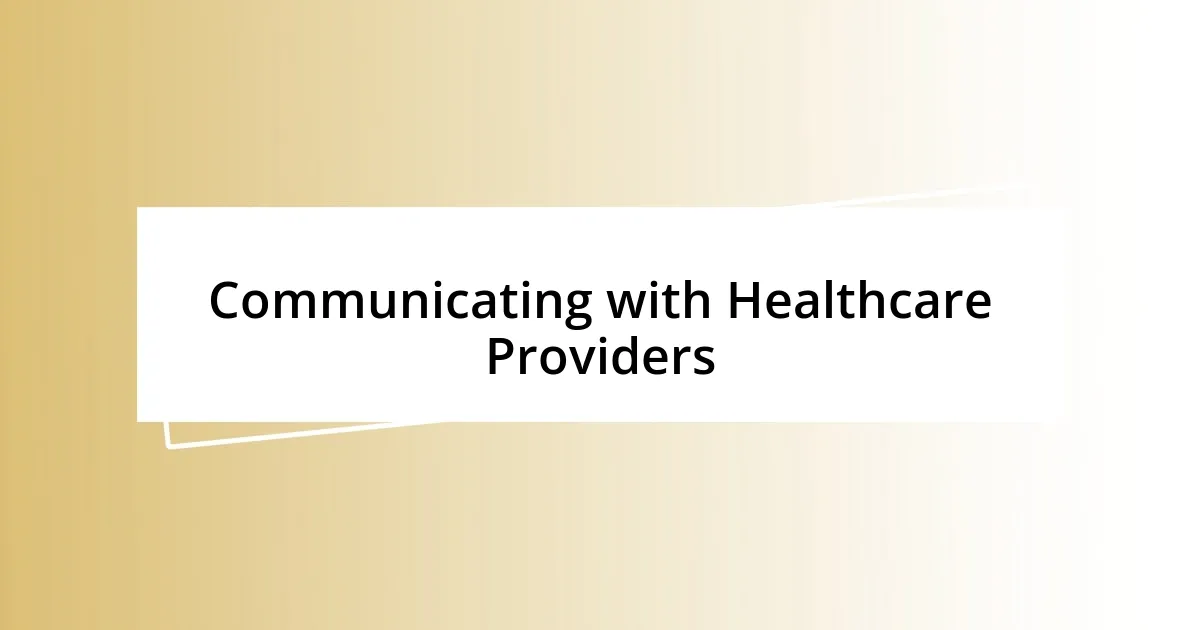
Communicating with Healthcare Providers
When I sit down to chat with my healthcare provider, I find that being open about my family’s health history is crucial. I recall a visit where I mentioned my father’s heart issues; my doctor turned the conversation into a comprehensive risk assessment. This exchange not only informed my provider about potential hereditary risks but also highlighted the importance of family health narratives in tailoring my care.
Clear communication, I’ve learned, doesn’t just spontaneously happen. It’s about preparing for that appointment. I remember making a list of questions before my last check-up, which transformed our interaction. I felt empowered asking about specific screenings and preventive measures, which opened the door to a conversation that was much more engaging and informative than previous visits. How often do we go into these discussions without fully utilizing the opportunity?
Listening is just as critical as sharing information. I’ve noticed when I actively engage with my healthcare provider—not just talking, but truly listening—I learn so much more. There was a time when a discussion about my family’s history of cancer led to proactive screening options I hadn’t considered. That moment underscored for me that our health is not just individual; it’s intertwined with the narratives of our loved ones, shaping the milestones of our personal health journeys.
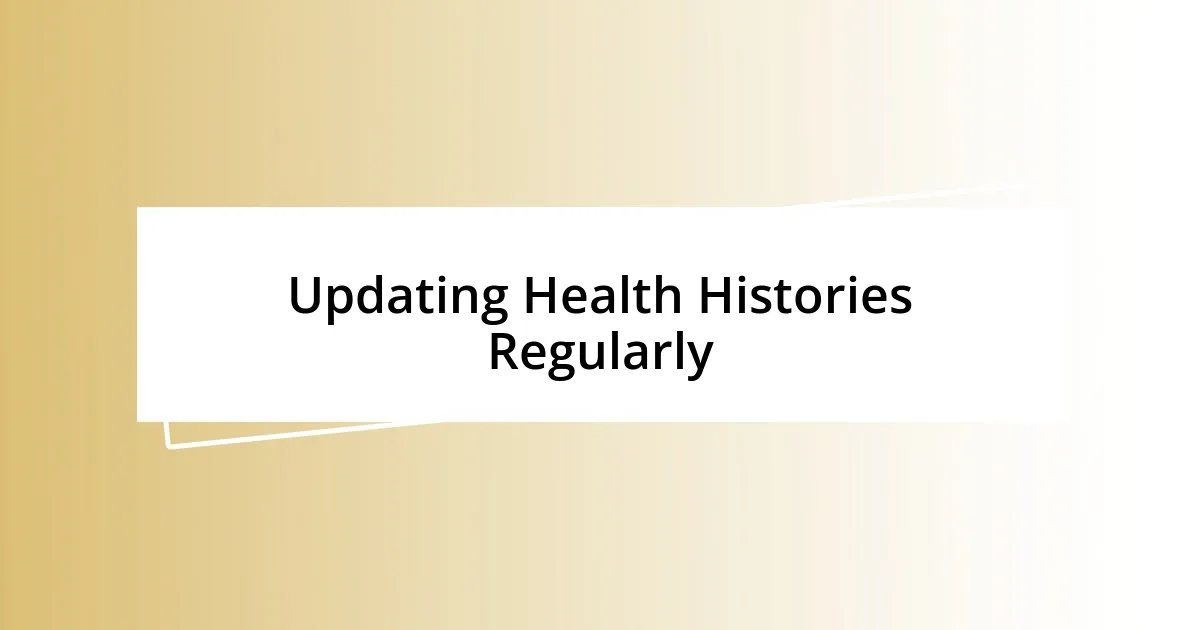
Updating Health Histories Regularly
Updating health histories isn’t something that should be a one-time task; it’s a continuous process. I found myself reflecting on this during a family gathering when a cousin mentioned a new diagnosis of hypertension. That moment was a wake-up call for me. It made me realize it was time to revisit our family health records and update them with the latest information. How often do we forget that health can change in the blink of an eye?
I remember sitting with my parents one afternoon, going through their medical records together. It was fascinating to see how our family’s health profile had evolved over the years. They shared stories tied to each condition—like how my grandfather’s diabetes shifted our family’s eating habits. I felt a mix of nostalgia and urgency; our conversations not only refreshed my understanding of our health history but also prepared us for future healthcare decisions. Isn’t it interesting how conversations can unlock these vital updates?
Regularly updating health histories allows me to identify any emerging patterns. After noticing my sister’s recent struggles with migraines, I updated the family health document to reflect this new challenge. This simple act not only keeps our records accurate but also helps me advocate for better screening and preventive care for all of us. It’s about staying proactive. How can we afford to ignore these evolving narratives when they have the power to influence our health choices?
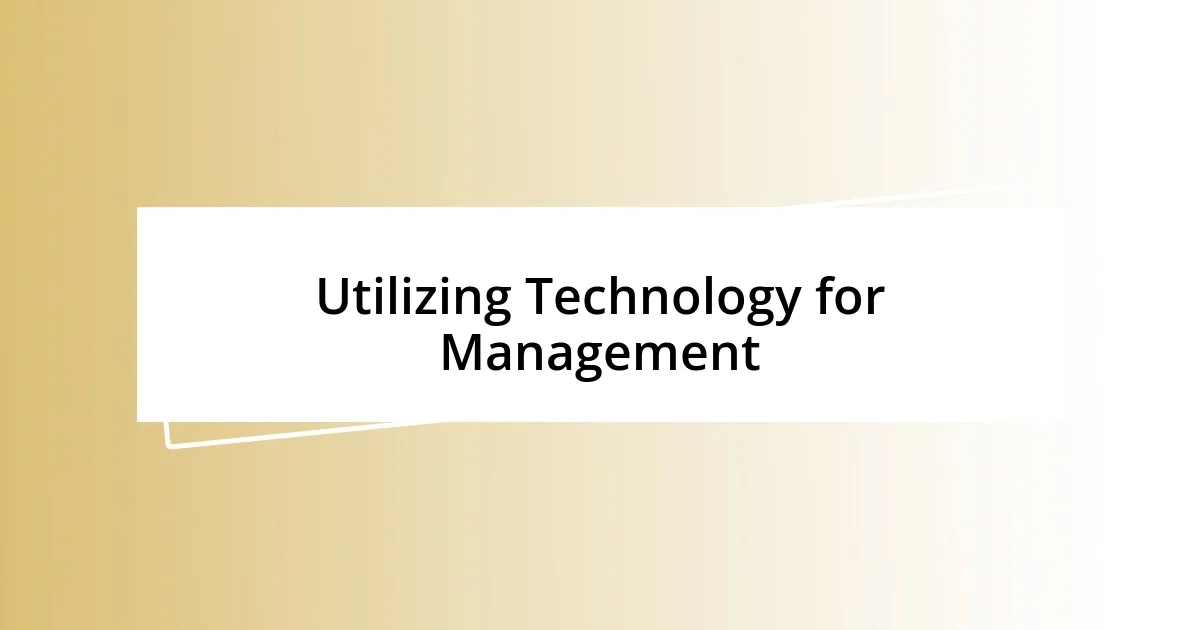
Utilizing Technology for Management
Utilizing technology has truly transformed how I manage my family’s health histories. For instance, I started using a health app that allows me to store medical records, track family health issues, and receive reminders for regular screenings. The convenience of having all this information at my fingertips not only makes it easier to share during doctor visits but also fosters moments of reflection when I spot patterns or changes in our health over time.
One memorable experience was when I logged into the app after learning about my uncle’s diagnosis of a rare autoimmune disease. I was able to quickly share that information with my family and update our records accordingly. This immediate action felt powerful—it reinforced our family’s connection through shared knowledge and a collective commitment to prioritizing health. How often do we leverage technology to bridge the gap in communication about family health?
Moreover, I’ve found that utilizing telehealth services enhances this journey even further. During a recent virtual consultation, I shared my family health history with a specialist who, in turn, was able to suggest targeted genetic screenings. I hadn’t considered that before! Isn’t it amazing how technology helps us not only stay informed but also act swiftly on our health management? In my experience, the combination of technology and family health histories brings a sense of confidence, enabling us to take charge of our well-being with informed decisions.









